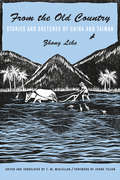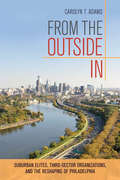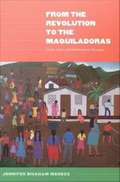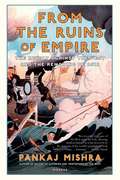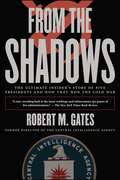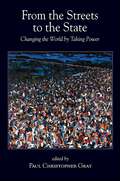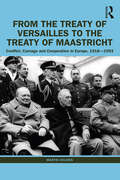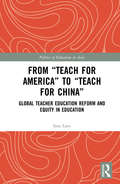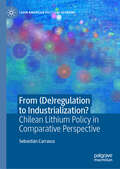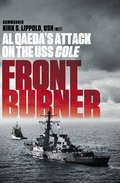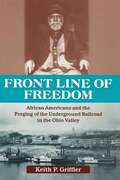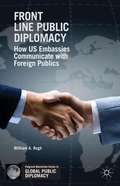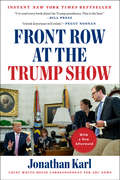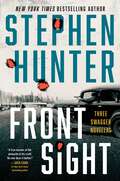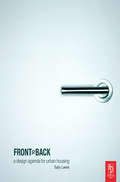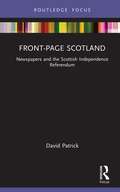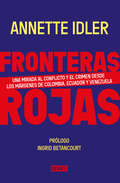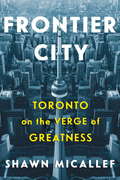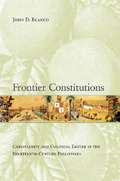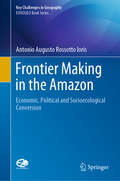- Table View
- List View
From the Old Country
by T. M. Mcclellan Lihe Zhong Tiejun ZhongThough he lived mostly in rural South Taiwan, Zhong Lihe (1915--1960) spent several years in Manchuria and Peking, moving among an eclectic mix of ethnicities, classes, and cultures. His ficitonal portraits unfold on Japanese battlefields and in Peking slums, as well as in the remote, impoverished hill-country villages and farms of Zhong Lihe's native Hakka districts. His scenic descriptions are deft and atmospheric, and his psychological explorations are acute. The first anthology to present his work in English, this volume features two novellas, ten short stories, and four short prose works.
From the Old Country: Stories and Sketches of China and Taiwan (Modern Chinese Literature from Taiwan)
by Zhong Lihe. Edited Translated by T. M. McClellan. Foreword by Zhong TiejunThough he lived most of his life in rural South Taiwan, Zhong Lihe spent several years in Manchuria and Peking, moving among an eclectic mix of ethnicities, social classes, and cultures. His fictional portraits unfold on Japanese battlefields and in Peking slums, as well as in the remote, impoverished hill-country villages and farms of his native Hakka districts. His scenic descriptions are deft and atmospheric, and his psychological explorations are acute. The first anthology to present his work in English, this volume features two novellas, ten short stories, and four short prose works.
From the Outside In: Suburban Elites, Third-Sector Organizations, and the Reshaping of Philadelphia
by Carolyn T. AdamsIn From the Outside In, Carolyn T. Adams addresses the role of suburban elites in setting development agendas for urban municipalities and their larger metropolitan regions. She shows how major nongovernmental, nonmarket institutions are taking responsibility for reshaping Philadelphia, led by suburban and state elites who sit on boards and recruit like-minded suburban colleagues to join them. In Philadelphia and other American cities, Third Sector organizations have built and expanded hospitals, universities, research centers, performing arts venues, museums, parks, and waterfronts, creating whole new districts that are expanding outward from the city's historic downtown. The author draws on three decades of scholarship on Philadelphia and her personal experience in the city's nonprofit world to argue that suburban elites have recognized the importance of the central city to their own future and have intervened to redevelop central city land and institutions. Suburban interests and state allies have channeled critical investments in downtown development and K-12 education. Adams contrasts those suburban priorities with transportation infrastructure and neighborhood redevelopment, two policy domains in which suburban elites display less strategic engagement. From the Outside In is a rich examination of the promise and difficulty of governance that is increasingly distinct from elected government and thus divorced from the usual means of democratic control within an urban municipality.
From the Revolution to the Maquiladoras: Gender, Labor, and Globalization in Nicaragua
by Jennifer Bickham MendezFrom the Revolution to the Maquiladoras is a major contribution to the study of globalization, labor, and women's movements. Jennifer Bickham Mendez presents a detailed ethnographic account of the Nicaraguan Working and Unemployed Women's Movement, "Mara Elena Cuadra" (mec), which emerged as an autonomous organization in 1994. Most of its efforts revolve around organizing women workers in Nicaragua's free trade zones and working to improve conditions in maquiladora factories. Mendez examines the structural and cultural elements of mec in order to demonstrate how globalization affects grassroots advocacy for social and economic justice. She argues that globalization has created opportunities for new forms of organizing among those local populations that suffer its effects and that mec, which has forged vital links with transnational feminist and labor groups, exemplifies the possibilities--and pitfalls--of this new type of organizing. Mendez draws on interviews with leaders and program participants, including maquiladora workers; her participant observation while she worked as a volunteer within the organization; and analysis of the public statements, speeches, and texts written by mec members. She provides a sense of the day-to-day operations of the group as well as its strategies. By exploring the tension between mec and transnational feminist, labor, and solidarity networks, she illustrates how mec women's outlooks are shaped by both their revolutionary roots within the Sandinista regime and their exposure to global discourses of human rights and citizenship. The complexities of the women's labor movement analyzed in From the Revolution to the Maquiladoras speak to social and economic justice movements in the many locales around the world.
From the Ruins of Empire: The Revolt Against the West and the Remaking of Asia
by Pankaj MishraA little more than a century ago, independent thinkers across Asia sought to frame a distinct intellectual tradition that would inspire the continent's rise to dominance. Yet this did not come to pass, and today those thinkers--Tagore, Gandhi, and later Nehru in India; Liang Qichao and Sun Yat-sen in China; Jamal al-Din al-Afghani and Abdurreshi al Ibrahim of the Ottoman Empire--are seen as outsiders within the main anticolonial tradition. But as Pankaj Mishra demonstrates in this enthralling portrait of like minds, Asia's revolt against the West is not the one led by faith-fired terrorists and thwarted peasants; rather, it is rooted in the ideas of these once renowned intellectuals. Now, when the ascendency of Asia seems possible as never before, From the Ruins of Empire is as necessary as it is timely--a book indispensable to our understanding of the world and our place in it.
From the Shadows: The Ultimate Insider's Story of Five Presidents and How They Won the Cold War
by Robert M. GatesAs the only person to rise from entry-level analyst to Director of the CIA and to serve on the White House staffs of four Presidents, Robert Gates is uniquely qualified to tell the unprecedented inside story of the Cold War. Drawing on his access to classified information and top-level involvement in policy decisions, Gates lays bare the hidden wars and operations the United States wages against communism worldwide. Ever certain that the fifty-year struggle with the Soviet Union was indeed a war, Gates makes candid appraisals of Presidents, key officials, and policies of the period. From the Shadows is a classic memoir on the career of a CIA officer at the centre of power during a time when the threat of global annihilation informed America's every move.
From the Streets to the State: Changing the World by Taking Power (SUNY series in New Political Science)
by Paul Christopher GrayFor decades, emancipatory struggles have been deeply influenced by the slogan "Change the world without taking power." Amid growing social inequalities and the return of right-wing authoritarianism, however, many now recognize the limits of disengaging from government and the state. From the Streets to the State chronicles many diverse and exciting projects to not only take state power but to fundamentally change it. A blend of scholars and activists explore issues like the nonsectarian relationships between new radical left parties, egalitarian social movements, and labor movements in Greece, Germany, Spain, Portugal, and Turkey. Contributors discuss municipal campaigns based in popular assemblies, solidarity economies, and independent political organizations fighting for racial, gender, and economic justice in cities such as Jackson, Vancouver, and Newcastle. This volume also studies the lessons learned from the Pink Tide in Latin America as well as the social movements of racialized and gendered workers transforming human rights across the United States. Finally, the book offers case studies from around the world surveying the role of state workers and public sector unions in radically democratizing public administration through coalitions between the providers and users of public services.
From the Treaty of Versailles to the Treaty of Maastricht: Conflict, Carnage And Cooperation In Europe, 1918 – 1993
by Martin HolmesThis book examines European history and politics between two very well-known but flawed treaties: The Treaty of Versailles and the Treaty of Maastricht. Taking the Treaty of Versailles, signed following World War I, as a starting point, the volume argues that while it was well-intentioned to the point of being utopian, it was also totally impractical, rearranging the map of Europe in a way which led to the tragic descent into conflict and barbarism in World War II. The volume then moves through the post war period, the outcome of the war producing the uneasy stability of a Cold War divided continent, and with the establishment of NATO in 1949, the process of European integration ushered in the era of cooperation. Under the influence of Charles de Gaulle, the newly created European Community acted as an association of sovereign states led by France and Germany, spurring economic growth and encouraging other countries to apply to join. After de Gaulle’s retirement in 1969, this approach was progressively abandoned in favour of a federal model of integration in which member states transferred their sovereignty to the institutions of what became the European Union. Europe was to be transformed from a continent to a country. The book concludes by analysing the Maastricht treaty, which enshrined this process, as being as fatally flawed as the Versailles Treaty and charts the post-Maastricht slow decline of the European Union giving way to widespread Euroscepticism. From the Treaty of Versailles to the Treaty of Maastricht will appeal to researchers and students alike interested in European history, politics and World War I and II.
From the Tricontinental to the Global South: Race, Radicalism, and Transnational Solidarity
by Anne Garland MahlerIn From the Tricontinental to the Global South Anne Garland Mahler traces the history and intellectual legacy of the understudied global justice movement called the Tricontinental—an alliance of liberation struggles from eighty-two countries, founded in Havana in 1966. <P><P>Focusing on racial violence and inequality, the Tricontinental's critique of global capitalist exploitation has influenced historical radical thought, contemporary social movements such as the World Social Forum and Black Lives Matter, and a Global South political imaginary. The movement's discourse, which circulated in four languages, also found its way into radical artistic practices, like Cuban revolutionary film and Nuyorican literature. <P>While recent social movements have revived Tricontinentalism's ideologies and aesthetics, they have largely abandoned its roots in black internationalism and its contribution to a global struggle for racial justice. In response to this fractured appropriation of Tricontinentalism, Mahler ultimately argues that a renewed engagement with black internationalist thought could be vital to the future of transnational political resistance.
From the War on Poverty to the War on Crime: The Making of Mass Incarceration in America
by Elizabeth HintonHow did the land of the free become the home of the world's largest prison system? Elizabeth Hinton traces the rise of mass incarceration to an ironic source: not the War on Drugs of the Reagan administration but the War on Crime that began during Johnson's Great Society at the height of the civil rights era.
From “Teach For America” to “Teach For China”: Global Teacher Education Reform and Equity in Education (Politics of Education in Asia)
by Sara LamThis book examines the role of Teach For China in addressing educational equity and expanding public participation in education. The author uses the case of Teach For China to explore the broader theme of the mobility of education models between contexts characterized by neoliberalism and those characterized by strong state control. Transnational advocacy networks are increasingly influential in the education policy making process. These networks, comprised of entrepreneurs and education corporations, think tanks, philanthropists, and government agencies, facilitate the global mobility of policy models. It is widely accepted that an education model should not be transplanted from one context to another without careful consideration of how contextual differences might impact the model’s effectiveness. The book explores the argument that the same model is not only quantitatively different in terms of effectiveness, but that models can play qualitatively different roles in neoliberal and strong-state contexts, sometimes moving education reform in opposite directions. The book will appeal to anyone interested in global teacher education reform and equity in education.
From: Chilean Lithium Policy in Comparative Perspective (Latin American Political Economy)
by Sebastián CarrascoThis book aims to elucidate the divergent institutional trajectories of lithium policies in Latin America, shedding light on how industrial development of mining activities can emerge in specific extractivist contexts. While focusing primarily on Chile's lithium policy, the study is further enriched by shadow case analyses of Argentina and Bolivia, reinforcing the robustness of the findings. The research introduces an original typology of industrial policies associated with lithium and argues that the interaction between the state and the companies involved in lithium extraction plays a decisive role in shaping public policy. In this regard, the typology demonstrates its heuristic capacity to analyze green industrialization processes related to lithium. Grounded in theories of state capacity and business power, this analysis posits that the evolution of public policies in this sector is influenced not only by the strength of the state but also by the strategic positioning of businesses in relation to these policies. Given their pivotal role in natural resource-based economic activities, companies emerge as essential actors within the context of industrial policy. This analysis makes a theoretical contribution to state-business relations, engaging with broader debates on green industrial policy within comparative political economy and offering a fresh perspective on the topic. Furthermore, the research explores how these processes related to lithium policies intersect with both global and local dynamics, particularly regarding the advancement of energy transitions and the socio-environmental conflicts in the affected territories.
Front Burner: Al Qaeda's Attack on the USS Cole
by Kirk LippoldOn October 12, 2000, eleven months before the 9/11 attacks, the USS Cole docked in the port of Aden in Yemen for a routine fueling stop. At 1118, on a hot, sunny morning, the 8,400-ton destroyer was rocked by an enormous explosion. The ship's commander, Kirk Lippold, felt the ship violently thrust up and to the right, as everything not bolted down seemed to float in midair. Tiles tumbled from the ceiling, and the ship was plunged into darkness, beginning to sink. In a matter of moments Lippold knew that the Cole had been attacked. What he didn't know was how much the world was changing around him. The bombing of the Cole was al Qaeda's first direct assault against the United States and expanded their brazen and deadly string of terrorist attacks throughout the Middle East. In this gripping first-person narrative, Lippold reveals the details of this harrowing experience leading his crew of valiant sailors through the attack and its aftermath. Seventeen sailors died in the explosion and thirty-seven were wounded--but thanks to the valor of the crew in the perilous days that followed, the ship was saved. Yet even with al Qaeda's intentions made clear in an unmistakable act of war, the United States government delayed retaliating. Bureaucrats and politicians sought to shift and pin blame as they ignored the danger signaled by the attack, shirking responsibility until the event was ultimately overshadowed by 9/11. Front Burner captures a critical moment in America's battle against al Qaeda, telling a vital story that has--until now--been lost in the fog of the war on terror.
Front Line Of Freedom: African Americans And The Forging Of The Underground Railroad In The Ohio Valley (Ohio River Valley Ser.)
by Keith P. GrifflerThe Underground Railroad, an often misunderstood antebellum institution, has been viewed as a simple combination of mainly white "conductors" and black "passengers." Keith P. Griffler takes a new, battlefield-level view of the war against American slavery as he reevaluates one of its front lines: the Ohio River, the longest commercial dividing line between slavery and freedom. In shifting the focus from the much discussed white-led "stations" to the primarily black-led frontline struggle along the Ohio, Griffler reveals for the first time the crucial importance of the freedom movement in the river's port cities and towns. Front Line of Freedom fully examines America's first successful interracial freedom movement, which proved to be as much a struggle to transform the states north of the Ohio as those to its south. In a climate of racial proscription, mob violence, and white hostility, the efforts of Ohio Valley African Americans to establish and maintain communities became inextricably linked to the steady stream of fugitives crossing the region. As Griffler traces the efforts of African Americans to free themselves, Griffler provides a window into the process by which this clandestine network took shape and grew into a powerful force in antebellum America.
Front Line Public Diplomacy
by William A. RughFront Line Public Diplomacy explains how American diplomats at US embassies abroad communicate with foreign publics to support American national interests, countering misperceptions and hostile portrayals of our country.
Front Row at the Trump Show
by Jonathan KarlAn account like no other from the White House reporter who has known President Trump for more than 25 years. We have never seen a president like this...norm-breaking, rule-busting, dangerously reckless to some and an overdue force for change to others. One thing is clear: We are witnessing the reshaping of the presidency. <P><P>Jonathan Karl brings us into the White House in a powerful book unlike any other on the Trump administration. He&’s known and covered Donald Trump longer than any other White House reporter. With extraordinary access to Trump during the campaign and at 1600 Pennsylvania Avenue, Karl delivers essential new reporting and surprising insights. <P><P>These are the behind-the-scenes moments that define Trump&’s presidency--an extraordinary look at the president, the person, and those closest to him. This is the real story of Trump’s unlikely rise; of the struggles and battles of those who work in the administration and those who report on it; of the plots and schemes of a senior staff enduring stunning and unprecedented unpredictability. <P><P>Karl takes us from a TV set turned campaign office to the strange quiet of Trump’s White House on Inauguration Day to a high-powered reelection campaign set to change the country’s course. He shows us an administration rewriting the role of the president on the fly and a press corps that has never been more vital. Above all, this book is only possible because of the surprisingly open relationship Donald Trump has had with Jonathan Karl, a reporter he has praised, fought, and branded an enemy of the people. This is Front Row at the Trump Show. <P><P><b> A New York Times Bestseller</b>
Front Sight: Three Swagger Novellas (Earl Swagger)
by Stephen HunterA collection of three interconnected novellas that follow each generation of the iconic Swagger family—grandfather Charles, father Earl, and fan favorite hero Bob Lee—from New York Times bestselling author, Pulitzer Prize winner, and &“true master at the pinnacle of his craft&” (Jack Carr, #1 New York Times bestselling author) Stephen Hunter.In City of Meat, Charles Swagger is on the hunt for notorious bank robber Baby Face Nelson when he traces a tip to the Chicago stock yards. While there, he&’s brutally assaulted by a madman involved in a nearby narcotics ring. The ring plans to spread its new drug to the residents of the disenfranchised 7th District of Chicago and to make matters worse, this is no ordinary drug—it makes some users happy, drives others insane, and kills many of the rest. Will Charles be able to stop the ring before it&’s too late? Or is he in over his head among the dark streets of Chicago? Earl Swagger investigates a violent bank robbery that left two dead and a fortune missing in small-town Maryland in Johnny Tuesday. At every turn, however, he&’s met with silence and hostility from the townsfolk, which makes sense when he uncovers municipal corruption, gang politics, jaded aristocrats, scheming gamblers, a hitman, a femme fatale, and a whole bunch of men with guns. Luckily, Earl has brought his own guns in this unputdownable noir mystery. Finally, in Five Dolls for the Gut Hook, a thirty-two-year-old Bob Lee Swagger is back from Vietnam nearly broken over good men lost for nothing. He&’s turned down that whiskey road to hell. But one afternoon he&’s awakened from his nightmares by two men with a problem. As nearby Hot Springs tries to retool its image from gambling paradise to family resort, a butcher has begun to prey on the city&’s young women, a figure straight out of a horror movie. Hot Springs Homicide is baffled and recruit Bob&’s help. &“I&’m a sniper,&” says Bob, &“not a detective.&” &“But,&” comes the reply, &“you are the son and grandson of two of the greatest detectives this state has ever produced.&” On that premise alone, Bob takes up the hunt for a killer who not only kills but desecrates. At the same time, we understand that Bob Lee Swagger is also hunting for his own salvation.
Front to Back: A Design Agenda For Urban Housing
by Sally LewisFRONT TO BACK sees urban housing as places to live rather than individual buildings. Using a unique design agenda it provides a step by step approach to achieving quality urban living.
Front-Page Scotland: Newspapers and the Scottish Independence Referendum (Routledge Focus on Journalism Studies)
by David PatrickThis book provides a varied, thorough and informative analysis of how newspapers covered the 2014 Scottish independence referendum in its critical final months. Providing a wealth of new empirical findings, the book engages with the key themes and issues which emerge from within the discourses themselves. Among the main observations are: the marginalisation of women, both as subjects and producers of the news; the late emergence of the London-based media to take the vote entirely seriously; the often myopic focus on Alex Salmond; and the framing of the debate through contrasting narratives of positive democratic engagement and societal division within Scotland. The book will be the first point of contact for readers interested in the subject, providing an overview which is meticulously researched, authoritative and engaging, and offering broader insights in the areas of journalism, political communication and media studies.
Fronteras rojas
by Annette IdlerLa guerra en Colombia vista desde sus fronteras. Las fronteras de un país dicen mucho sobre la sociedad que lo conforma. En estos bordes sensibles el conflicto echa raíces con facilidad, es allí donde se provee y se mimetiza, donde se fortalece y crea leyes propias. En ausencia del Estado aparecen formas de organización, lógicas y relaciones que son el corazón mismo de la guerra. Annette Idler ha logrado entender la complejidad de los territorios transfronterizos, y su original investigación se convierte en una alternativa al trajinado enfoque de centro-periferia, para el que estos lugares inhóspitos tienen poco que decir sobre nuestra realidad política y social. Con Fronteras rojas, Idler abre una nueva dimensión para comprender la guerra y buscar la paz
Frontier City: Toronto on the Verge of Greatness
by Shawn MicallefToronto is emerging from an identity crisis into a glorious new era. It began as a series of reports from the civic drama of the 2014 elections. But beyond the municipal circus, writer and commentator Shawn Micallef discovered the much bigger story of a city emerging into greatness. He walked and talked with candidates from all over Greater Toronto, and observed how they energized their communities, never shying away from the problems that exist within them -- poverty, violence, racism, and drugs -- but advocating solutions that bring people together. Shawn Micallef introduces us to those fighting for a more inclusive vision of Toronto and reveals the promise and potential for a city that has been suffering through a severe identity crisis but is now on a steep upturn. Toronto, he says, is set fair to be a new urban model for cities all over the world. Micallef reveals Toronto in all its rich variety. It is hard, he says, to grasp the vast size and scope of Toronto until you spend a few hours walking through unfamiliar neighbourhoods. Each reveals another adjacent to it, and then another, and another. The city goes on and on, into unheralded ravines and oblique views of the downtown skyline. Hiding in all that geography is not only great beauty, but a force for change that's been building for decades as people arrived here from every corner of the globe. Frontier City is a revelatory view of the Toronto of today and an inspiring vision of the Toronto of the near future.From the Hardcover edition.
Frontier Constitutions: Christianity and Colonial Empire in the Nineteenth-Century Philippines
by John D. BlancoA study of the cultural transformations arrived at by Spanish colonists, native-born creoles, mestizos (Chinese and Spanish), and indigenous colonial subjects in the Philippines during the crisis of colonial hegemony in the nineteenth century and the social anomie that resulted from this crisis in law and politics.
Frontier Democracy
by Silvana R. SiddaliFrontier Democracy examines the debates over state constitutions in the antebellum Northwest (Indiana, Illinois, Iowa, Michigan, Minnesota, Ohio, and Wisconsin) from the 1820s through the 1850s. This is a book about conversations: in particular, the fights and negotiations over the core ideals in the constitutions that brought these frontier communities to life. Silvana R. Siddali argues that the Northwestern debates over representation and citizenship reveal two profound commitments: the first to fair deliberation, and the second to ethical principles based on republicanism, Christianity, and science. Some of these ideas succeeded brilliantly: within forty years, the region became an economic and demographic success story. However, some failed tragically: racial hatred prevailed everywhere in the region, in spite of reformers' passionate arguments for justice, and resulted in disfranchisement and even exclusion for non-white Northwesterners that lasted for generations.
Frontier Encounters
by Franck Billé Grégory Delaplace & Caroline HumphreyChina and Russia are rising economic and political powers that share thousands of miles of border. Yet, despite their proximity, their practical, local interactions with each other — and with their third neighbour Mongolia — are rarely discussed. The three countries share a boundary, but their traditions, languages and worldviews are remarkably different. <p><p> Frontier Encounters presents a wide range of views on how the borders between these unique countries are enacted, produced, and crossed. It sheds light on global uncertainties: China’s search for energy resources and the employment of its huge population, Russia’s fear of Chinese migration, and the precarious economic independence of Mongolia as its neighbours negotiate to extract its plentiful resources. <p> Bringing together anthropologists, sociologists and economists, this timely collection of essays offers new perspectives on an area that is currently of enormous economic, strategic and geo-political relevance.
Frontier Making in the Amazon: Economic, Political and Socioecological Conversion (Key Challenges in Geography)
by Antonio Augusto IorisThis book discusses the outcomes of more than ten years of research in the southern tracts of the Amazon region, and addresses the expansion of the agricultural frontier, consolidation of the agribusiness-based economy, and expansion of regional infrastructure (roads, dams, urban centres, etc).It combines extensive empirical evidence with the international literature on frontier-making and regional Amazonian development, and adopts a critical politico-geographical perspective that will benefit scholars in various other disciplines.This book is intended to push the current theoretical and methodological boundaries regarding the controversies and impacts of agribusiness in the region. A new international scientific network, led by the author, is investigating the broader context of the themes analysed here.
